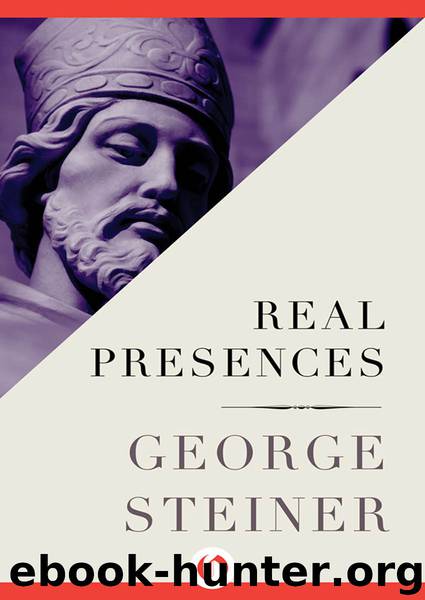Real Presences by George Steiner

Author:George Steiner
Language: eng
Format: epub
Publisher: Open Road Integrated Media
8
There are grounds for rebuttal. I have already alluded to the self-serving jargon which infects all but the (rare) best of post-structuralist and deconstructive rhetoric. One can also advert to the feebleness of the actual counter-readings and ‘disseminations’ offered by the deconstructionists. When the text or sign-experience is to be (de-)faced and de-mythologized, the results are, again with some exceptions, of a portentous banality. Ambiguities, self-contradictions, breaches and elisions of authorial intentionality, polysemic indeterminacies, long observed and even decomposed by previous readers, are given the burnish of discovery. In regard to poetry and prose in the Anglo-American tradition, nothing in post-structuralist and deconstructive readings surpasses the playful, but linguistically and historically informed exercises of William Empson, most especially in his Structure of Complex Words, or the philological but politically-lit penetration of Kenneth Burke’s studies in rhetoric, motive and grammatology. Even where it is manipulated by major talents, deconstruction tends to bear either on marginal texts (Sade, Lautréamont) or on secondary work by a great writer (Barthes on Balzac’s Sarrazine). The classics of deconstruction, in Derrida or Paul De Man, are ‘misreadings’ not of literature but of philosophy; they address themselves to philosophical linguistics and the theory of language. The masks they seek to strip off are those worn by Plato, by Hegel, by Rousseau, by Nietzsche or Saussure. Deconstruction has nothing to tell us of Aeschylus or Dante, of Shakespeare or Tolstoy.
But however cogent, these objections touch only on contingency. Other important movements of argument and speculative rebellion have fallen into the busy hands of mandarin mediocrity and preciousness. In principle, the low quality of deconstructive work being turned out by academic mills cannot be held to invalidate the case itself or its potential. Some successor to Derrida may share not only the master’s epistemological élan, erudition and metaphysical wit — a very rare gift — but could invest these in a truly literary sensibility, in a feeling for language and form, however wary. One cannot, in principle, exclude the possibility that a Roland Barthes yet to come will address his supple playfulness, his licentious dubieties to, say, David’s song over Jonathan or the dialogue between Ivan and Alyosha Karamazov.
No: in order to be telling — which is itself an idiom all too susceptible of deconstruction — a critique of the new a-semantics and grammatology must seek out some central philosophic ground.
The deconstructive discourse is itself rhetorical, referential and altogether generated and governed by normal modes of causality, of logic and of sequence. The deconstructive denial of ‘logocentrism’ is expounded in wholly logocentric terms. ‘Metacriticism’ is criticism still, often of the most evidently discursive and persuasive kind. To some degree, symbolic logic has been able to develop formal presentations of so abstract and generalized a type that they can be used to test, to deconstruct other formal languages from, as it were, outside. No such extraterritoriality is available to post-structuralist and deconstructive practitioners. They have invented no new speech, no immaculate conceptualizations. The central dogma, according to which all readings
Download
This site does not store any files on its server. We only index and link to content provided by other sites. Please contact the content providers to delete copyright contents if any and email us, we'll remove relevant links or contents immediately.
The remains of the day by Kazuo Ishiguro(7539)
Tools of Titans by Timothy Ferriss(6934)
The Black Swan by Nassim Nicholas Taleb(6182)
Inner Engineering: A Yogi's Guide to Joy by Sadhguru(5886)
Giovanni's Room by James Baldwin(5870)
The Way of Zen by Alan W. Watts(5786)
The Six Wives Of Henry VIII (WOMEN IN HISTORY) by Fraser Antonia(4784)
The Power of Now: A Guide to Spiritual Enlightenment by Eckhart Tolle(4747)
Astrophysics for People in a Hurry by Neil DeGrasse Tyson(4613)
Asking the Right Questions: A Guide to Critical Thinking by M. Neil Browne & Stuart M. Keeley(4563)
12 Rules for Life by Jordan B. Peterson(3722)
The Ethical Slut by Janet W. Hardy(3494)
Skin in the Game by Nassim Nicholas Taleb(3455)
Housekeeping by Marilynne Robinson(3394)
The Art of Happiness by The Dalai Lama(3376)
Double Down (Diary of a Wimpy Kid Book 11) by Jeff Kinney(3266)
Skin in the Game: Hidden Asymmetries in Daily Life by Nassim Nicholas Taleb(3259)
Walking by Henry David Thoreau(3227)
12 Rules for Life: An Antidote to Chaos by Jordan B. Peterson(3195)
